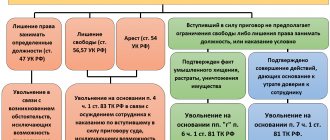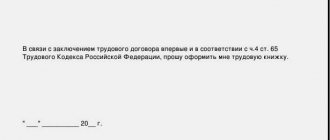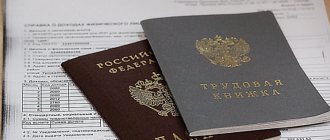Counterclaim
The vast majority of demands for recognition of a transaction as concluded are filed as a counterclaim. This form of rights protection is resorted to in cases where the initial requirements are related to:
- challenging the conclusion or validity of the agreement (determination of the Supreme Court of the Russian Federation dated November 17, 2015 No. 310-ES15-14040);
- recovery of unjust enrichment (determination of the Armed Forces of the Russian Federation dated 04/05/2016 No. 305-ES16-1822);
- release of leased property (determination of the Supreme Court of the Russian Federation dated January 11, 2016 No. 310-ES15-16993).
For what purpose are counterclaims made to recognize the transaction as concluded? We will find the answer in Art. 132 of the Arbitration Procedure Code of the Russian Federation and Art. 138 Code of Civil Procedure of the Russian Federation. Thus, one of the conditions for the court to accept a counterclaim is the following: satisfaction of the counterclaim will exclude the satisfaction of the original claim. In other words, in this way it is possible to achieve a refusal of a court decision on the claims stated by the plaintiff.
Returning to our examples, satisfying the counterclaim to recognize the transaction as concluded entails:
- impossibility of recognizing it as not concluded or invalid;
- the impossibility of claiming unjust enrichment and transferring the relations of the parties into a contractual framework;
- impossibility of eviction of the tenant and recognition of his rights to own and use the leased property.
Let us remind you that a counterclaim can be filed only in the period before the decision is made by the court of first instance. Such a claim is brought according to the general rules established for any claims, and is considered together with the original claim.
General provisions
The parties to a transaction often face various disputes, and there is a need to confirm the fact of its conclusion.
A transaction is considered automatically concluded if the procedure for its conclusion and form established by law is observed, and there is no uncertainty in its essential conditions.
How the proper form of transaction can be observed:
| The agreement on it is drawn up in the form of one document | in which the signatures of the parties are affixed |
| In response to the offer | written acceptance was sent |
| The parties exchanged | electronic documents |
| Taking actions | showing a desire to complete a transaction in response to an offer made in accordance with the Civil Code of the Russian Federation |
In some cases, an oral form of agreement may be provided, which significantly complicates confirmation of the conclusion of a transaction in court.
For example, in many cases a gift agreement between individuals can be concluded orally.
If a dispute arises (for example, with a third party), a statement of claim to recognize the gift agreement as concluded is quite justified, but it will not be easy for the plaintiff to prove his case.
Some contracts are considered concluded only when the property is actually transferred. Such agreements include, for example, a loan agreement.
[Show slideshow]
Most demands for recognition of a contract as concluded appear in counterclaims; they are usually resorted to in the following cases:
| The fact of the conclusion is disputed | or the validity of the contract |
| The original lawsuit contains claims | on recovery of unjust enrichment |
| Initial requirements are related | with the release of the leased property |
Legislative norms
The list of main ways to protect rights is given in Art. 12 of the Civil Code of the Russian Federation.
However, this is a so-called non-closed article, i.e. Other forms of defense are also allowed, including filing a claim to recognize the contract as concluded.
The fact of concluding an agreement is also stated in the Civil Code of the Russian Federation, and specifically in Article 432. According to it, a claim to recognize a transaction as concluded must confirm the fact that the parties have reached an agreement on all basic conditions.
Main concepts
A contract is an agreement establishing mutual rights and obligations between the parties.
Any legal entity or individual can be a party to the agreement. The procedure for concluding an agreement is established by the Civil Code of the Russian Federation.
Typically, an agreement is drawn up in writing, but current legislation provides for various forms of execution of a transaction, including oral.
Factors influencing the status of the transaction
Main features of the concluded agreement:
| The proper form of the transaction has been observed | for example, for transactions for the sale of real estate, the Civil Code of the Russian Federation establishes a written form in the form of one document |
| Regarding essential conditions | no uncertainty |
It is the Civil Code of the Russian Federation that indicates that an agreement will not be considered concluded if the parties were unable to reach agreement on all its terms.
In this case, no indication is made of the forms for concluding the contract. Consequently, a claim to recognize a transaction as concluded must confirm the fact that agreement has been reached on all essential terms.
Video: invalidity of the contract
Statement of claim to invalidate a transaction: form
The statement of claim can be downloaded here.
In ____________________________ (name of the court) Plaintiff: ________________________ (full name, address) Defendant: _____________________ (full name, address) Cost of claim: _____________________ (full amount of claims)
STATEMENT OF CLAIM
on declaring a transaction invalid and applying the consequences of invalidity of the transaction
“___”_________ ____ the year an agreement was concluded on _________ (specify what the contract is about) in relation to _________ (specify property). Subsequently, I learned that the concluded agreement is an invalid transaction _________ (indicate the grounds for declaring the transaction invalid).
In accordance with Article 167 of the Civil Code of the Russian Federation, an invalid transaction does not entail legal consequences, except for those related to its invalidity, and is invalid from the moment of its completion. If the transaction is invalid, each party is obliged to return to the other everything received under the transaction, and if it is impossible to return what was received in kind (including when what was received is expressed in the use of property, work performed or service provided), reimburse its value in money - if there are other consequences The invalidity of a transaction is not provided for by law.
The defendant is obliged to return to me everything received under the invalid transaction.
Based on the above, guided by Articles 131-132 of the Civil Procedure Code of the Russian Federation,
Ask:
- Recognize the transaction _________ (indicate what the transaction is about) dated "___"_________ ____ between _________ (full name of the plaintiff) and _________ (full name of the defendant) invalid.
- Apply the consequences of invalidity of the transaction by returning _________ (indicate how to bring the parties to their original position before concluding the transaction).
Invalidation of a will: judicial practice.
How to invalidate a gift agreement, read here.
List of documents attached to the application (copies according to the number of persons participating in the case):
- Copy of the statement of claim
- Document confirming payment of state duty
- Document confirming the transaction
- Documents confirming the invalidity of the transaction
Date of application “___”_________ ____
Plaintiff's signature _______
The Supreme Court gave clarifications on void contracts
The Supreme Court of the Russian Federation presented an overview of judicial practice on disputes concerning conflicts of interest between a customer and a participant in public procurement (clause 9, part 1, article 31 of Law No. 44-FZ “On the contract system in the field of procurement of goods, works, services for the provision of state and municipal needs"). This document was approved by the Presidium of the Supreme Court on September 28.
The review provides an interpretation of 10 problematic aspects of resolving cases in this category. In particular, the Supreme Court clarifies that the procurement participant’s compliance with the requirements stipulated by Law No. 44-FZ at the time the winner is identified has no legal significance if the procurement participant did not meet these requirements at the time of submitting an application to participate in the electronic auction.
In addition, it is not allowed to force the customer to fulfill the contract if, after its conclusion, it is established that the supplier (contractor, performer) does not meet the requirements for the absence of a conflict of interest imposed on procurement participants, which allowed him to become the winner. In this case, the customer’s refusal to fulfill the contract, according to the rules of Part 15 of Art. 95 of Law No. 44-FZ is legal.
The Supreme Court also notes that the state (municipal) contract concluded by the winning bidder and the customer if there is a conflict of interest between them is void (clause 2 of Article 168 of the Civil Code of the Russian Federation).
The procurement participant, who was not recognized as the winner of the auction, filed a claim with the arbitration court against the parties to the municipal contract to declare it invalid. The parties to the contract in their objections to the claim referred to the lack of legitimate interest of the applicant in challenging the said transaction.
The court of first instance, having established the existence of a conflict of interest between the customer and the supplier, satisfied the claims.
According to the provisions of paragraph 1 of Art. 168 of the Civil Code, as a general rule, a transaction that violates the requirements of a law or other legal act is voidable. At the same time, a transaction that violates the requirements of a law or other legal act and at the same time encroaches on public interests or the rights and legally protected interests of third parties is void, unless it follows from the law that such a transaction is contestable or other consequences of the violation not related to with the invalidity of the transaction (clause 2 of Article 168 of the Civil Code).
A transaction that infringes on public interests is one in which an express prohibition established by law was violated (the corresponding legal position is contained in paragraph 75 of the Resolution of the Plenum of the Armed Forces of the Russian Federation dated June 23, 2015 No. 25 “On the application by courts of certain provisions of Section I of Part first Civil Code of the Russian Federation").
Part 2 art. 8 of Law No. 44-FZ establishes the following legislative prohibition: it is prohibited for customers, specialized organizations, their officials, procurement commissions, members of such commissions, procurement participants to perform any actions that contradict the requirements of Law No. 44-FZ, including those that lead to restriction of competition, in particular, unreasonable limitation of the number of procurement participants. These requirements also include the requirements contained in clause 9, part 1, art. 31 of Law No. 44-FZ.
Thus, the contested municipal contract, which was concluded in the presence of a conflict of interest between the customer and the supplier, violates the express legislative prohibition established by Part 2 of Art. 8 in conjunction with clause 9 of Part. Art. 31 of Law No. 44-FZ, thereby encroaching on public interests.
The court also noted that due to non-compliance with the procurement procedure, the rights of third parties - procurement participants with whom the municipal contract was not concluded, are violated due to the provision of an advantage to a person who does not comply with the requirements of Law No. 44-FZ.
Taking into account the above, the court came to the conclusion that the municipal contract concluded by the enterprise and the company by virtue of clause 2 of Art. 168 of the Civil Code is void, as violating the prohibition established by clause 9, part 1, art. 31 of Law No. 44-FZ, and encroaching on public interests and the rights of third parties.
In relation to the situation under consideration, within the meaning of Art. 167 of the Civil Code, due to the invalidity of the municipal contract, each party is obliged to return to the other everything received under the transaction, and if it is impossible to return what was received in kind (including when what was received is expressed in the use of property, work performed or service provided) - to reimburse its value in money, unless other consequences of the invalidity of the transaction are provided for by law. In this case, the use of bilateral restitution should ensure that all parties to the transaction return to their original position.








